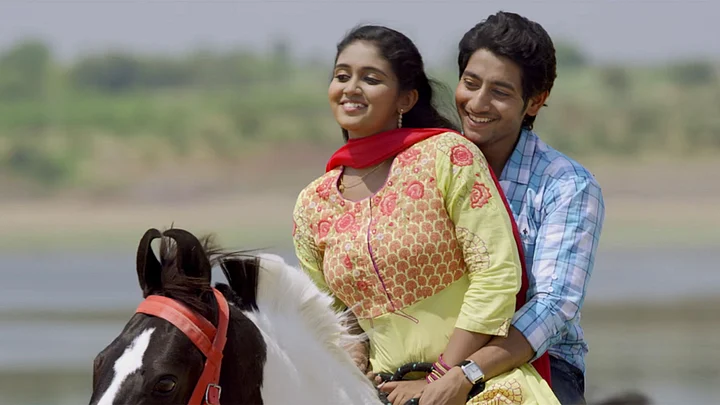Nagraj Manjule’s Sairat (Marathi word for Wild), which premiered at the Berlin International Film Festival, and won a National Award Special Mention for its heroine Rinku Rajguru, opens in theatres on April 29th. An inter-caste love story, it is thoroughly enjoyable and funny, yet hard-hitting.
His earlier film Fandry won the Jury Grand Prize at the Mumbai Film Festival, Best Film at the Indian Film Festival of Los Angeles, and National Film Award for Best Debut Film. Manjule, who hails from Jeur village in Sholapur, is an accomplished poet and his book of poems Unhachya Kataviruddha has won multiple awards. He has also acted in The Silence, Fandry and Sairat. Here are a few excerpts from an interview with the film’s maker:
After Sairat’s rousing reception at the Berlin International Film Festival, and Rinku Rajguru’s National Award, what are your expectations as your film releases tomorrow?
I am very happy with what Sairat has achieved so far. The enthusiastic response of the international audience at the Berlin Film Festival felt like a lifetime achievement award. There has been an excellent response to the preview screenings in Mumbai. It will release in many Indian cities (including Mumbai, Pune, Bengaluru, Gurgaon, with English subtitles) and overseas. The Zingat song has got over 20 lakh hits on YouTube, and my Facebook page has over 90,000 followers! Fandry was appreciated by critics and the audience worldwide. With Sairat I’m aiming for a larger public, now that I’m sure the audience loves my work. Sairat, like Fandry, is still about the challenges of an inter-caste romance, but in a mainstream format. The climax of Sairat is so powerful and unexpected, no one will forget it. Are you cynical or hopeful about the issue of caste in India?
Love should be a simple, sweet thing. But in my India, love is the most difficult thing! Love runs scared and rarely happens, because it is actively and successfully prevented. What is the problem if people kiss or embrace (in public)? You can’t kiss on the road, but you can kill or piss or shit on the road, and that’s OK?
Your heroine Archie (Archana), does what few Bollywood heroine do: she drives the romance, rides a Bullet, shoots goons, and even rescues the hero from police detention. Have you ever known such women?
I have seen a few girls like that, maybe not as bindaas as Archie, but close. When they are at their parents’ home, girls are more free and confident; after marriage, they become the opposite. But women are an upgraded breed!
Girls mature much faster, but boys remain boys. Yet, our society treats women so badly, with dowry and violence. Women are the Dalits of the Dalits.
Both Rinku Rajguru and Akash Thosar put in great performances. How did you draw out such talent from non-actors?
When casting them, I didn’t care if they could act or not. I was only concerned about how they look and how they talk, their voice and expression, and a bit of confidence. I could handle all the rest. Rinku is just 14 and Aakash is 20. They lived with me in my Pune house for 2-3 months before the shoot. I wouldn’t always tell them how do scenes, I’d ask—what would you say?
As you faced challenges getting an education, was it difficult to persuade your parents to let you study Marathi literature, rather than something “useful”?
My father broke stones for a living. His only dream for me was “savlitli naukri kar” –get a job in the shade. My father could read and write, but my mother is illiterate. So when I went to university, they just knew it was to study, but not much more. So I was free to do as I pleased! When I was a child, adults would not take me seriously. “You’re small, buzz off, don’t speak in the middle,” they’d say. I felt suppressed. But cinema has liberated me from my silence.
Cinema has given me a voice. What I couldn’t express in my life, I can express in cinema.
Your films are acclaimed worldwide. But Rohit Vemula’s suicide represents the continuing oppression of Dalits. Do you feel your cinema can influence people—and has it changed you?
What Mahatma Gandhi and Ambedkar could not achieve, what can a film like Sairat hope to achieve? Still, I am hopeful. As for me, I now have a space in people’s minds in India, UK and the US, it’s not a question of being poor or a Dalit. After Fandry screened in London, some Dalit families took me to their home and said, after 100 years we are seeing a Dalit film. I became their voice. It was unbelievable and made me very happy.
(Meenakshi Shedde is South Asia Consultant to the Berlin Film Festival, award-winning critic, curator to festivals worldwide and journalist. meenakshishedde@gmail.com)
(At The Quint, we question everything. Play an active role in shaping our journalism by becoming a member today.)
